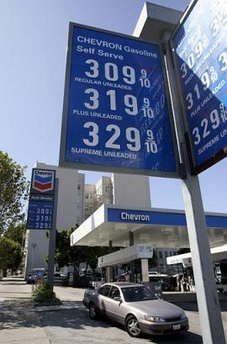Car-centricity and "Project Energy Independence"
 This photo provided by Jeep shows 140 vehicles positioned by Jeep owners in the form of an American flag Thursday, Aug. 11, 2005, in Mount Pocono, Pa., to promote the National Anthem Project, a national effort to re-teach Americans the words to 'The Star-Spangled Banner.' Two out of three Americans do not know the words to the National Anthem, according to a Harris Poll survey. The flag, measuring 73 feet wide by 191 feet long, was created to celebrate the first year of this multi-year national education initiative of which Jeep is a national sponsor. (AP transmitted Jeep photo by Stuart Ramson.)
This photo provided by Jeep shows 140 vehicles positioned by Jeep owners in the form of an American flag Thursday, Aug. 11, 2005, in Mount Pocono, Pa., to promote the National Anthem Project, a national effort to re-teach Americans the words to 'The Star-Spangled Banner.' Two out of three Americans do not know the words to the National Anthem, according to a Harris Poll survey. The flag, measuring 73 feet wide by 191 feet long, was created to celebrate the first year of this multi-year national education initiative of which Jeep is a national sponsor. (AP transmitted Jeep photo by Stuart Ramson.)The op-ed in today's New York Times by Thomas Homer-Dixon,"Caught Up in Our Own Connections," makes the point that the U.S. transportation systems is dependent on oil for 95% of its energy; 2/3 of the oil consumed by the United States is imported.
Also see "Energy bill leaves U.S. in policy limbo," by David Olive from the Toronto Star, where he writes:
Yet far from launching "an energy strategy for the 21st century," as Bush said at the energy-bill signing ceremony this week, the Energy Policy Act of 2005 is a typical Congressional porkfest of subsidies to the usual special pleaders in the energy, agricultural and environmental sectors that represent a mere continuation of the status quo.
The status quo is the doubling of oil prices in the past two years; soaring demand from emerging super-economies China, India and the former Soviet empire; a paucity of new giant oil fields to replace the depletion of existing ones; and a projected increase in U.S. reliance on imported oil from the current 58 per cent of total consumption to 68 per cent by 2025.
One of the few substantial campaign planks of 2000 running mates Bush and Dick Cheney, ex-oilmen with vaunted energy expertise, was a promised dramatic overhaul of U.S. energy policy. That has yet to materialize. Bush missed an opportunity post 9/11 to rally his country to the goal of energy self-sufficiency by asking Americans to accept a federal gasoline tax that would help reduce consumption. He missed another when Cheney's 2002 blueprint for energy policy reform promptly disappeared down the memory hole.
Bush missed a third chance in 2003, when an energy bill finally was taking shape in Congress, by failing to say he would veto that ineffectual and pork-laden proposed legislation, and instead call for a more focused effort on curbing energy consumption and testing the viability of alternative energy sources. (Fiscal conservatives in the U.S. Senate killed that bill.)
The Energy Policy Act of 2005 is a replay of the unlamented 2003 bill. In this fourth missed opportunity, Bush has signed a bill that rejects calls on America to commit itself to an average annual 1 per cent reduction in energy consumption; and to require that Detroit preoccupy itself with fuel efficiency rather than cupholders, seat-back TV screens and the ridiculously over-powered 345-hp. engines that Chrysler has begun to install in its family sedans.
Also rejected, by both Bush and the GOP leadership in Congress, was a proposed goal of generating at least 10 per cent of the nation's electricity from non-traditional sources by 2050. (Britain has committed to do so by 2030.)
 Chevron service station on Van Ness Avenue displays gas prices above $3 a gallon in San Francisco, Thursday, Aug. 11, 2005. For the West, the average price of unleaded hit $2.62 a gallon, at least 20 cents higher than any other region in the country. Maintenance problems at U.S. and foreign refineries and the repeated threat of hurricanes along the oil-producing Gulf Coast helped push prices higher. Crude oil reached a record high price of $65 a barrel Wednesday. (AP Photo/Eric Risberg)
Chevron service station on Van Ness Avenue displays gas prices above $3 a gallon in San Francisco, Thursday, Aug. 11, 2005. For the West, the average price of unleaded hit $2.62 a gallon, at least 20 cents higher than any other region in the country. Maintenance problems at U.S. and foreign refineries and the repeated threat of hurricanes along the oil-producing Gulf Coast helped push prices higher. Crude oil reached a record high price of $65 a barrel Wednesday. (AP Photo/Eric Risberg)



0 Comments:
Post a Comment
<< Home